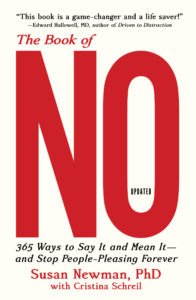How One Mom Stopped People-Pleasing and Got Her Life Back by Susan Newman, PhD
 My favorite day of the year is the day we switch from Daylight Savings Time to Standard Time. The clock goes back, giving me a precious extra hour. I always seem to need more time.
My favorite day of the year is the day we switch from Daylight Savings Time to Standard Time. The clock goes back, giving me a precious extra hour. I always seem to need more time.
As an older mother, I had more obligations and more job responsibility as many women do who juggle raising children, caring for older parents and managing the routine day-to-day tasks. It can feel as if everyone wants or needs you for some reason or another. I don’t recall being in such demand in my 20s.
One of the traps is, like most of us, I think I can do more than I can. This often leads to helping others solve their problems on top of my own. I don’t want to disappoint my children, wanted to meet my parents’ needs as they aged, give a top performance at work, and be available for the committee or organization asking for assistance. I agreed to whatever was asked of me; I didn’t want others to think I was selfish and uncaring—something that rarely happens when you turn someone down. But, there are only a certain number of hours in a day, and something had to give.
I realized that I needed to do a better job of setting up and guarding my boundaries. They are key to placing greater emphasis on your self-respect and your goals—and not being an inveterate people-pleaser buried in an avalanche of to-dos. My overload, perpetual exhaustion and frustration were the impetus for writing The Book of No: 365 Ways to Say it and Mean it―and Stop People-Pleasing Forever. From my research, I learned that you can say no to friends, neighbors, family, coworkers, bosses and even pushy salespeople without hurting feelings or damaging relationships. And children—be they toddlers or teens—actually benefit developmentally when a parent says no.
You won’t be able to say no to everything asked of you, nor will you want to, but you can find a middle ground. You don’t have to be an ever-accommodating yes-person to be loved, respected, and admired. Saying no is not only liberating—it is your right.
6 Ways to Get Started Saying No Comfortably:
These six basic steps—and how you respond to the questions—will help you start to shore up your boundaries.
- Get your priorities straight. Who has first crack at you without your feeling burdened or anxious? Who are you genuinely always happy to assist? A child? A friend? A parent? A partner? A boss?
- Pay attention to how you parcel out your time. This helps you spot imbalances in your relationships. If most of your time is monopolized assisting one friend, for example, when will you see other friends? If family or job demands are high, what’s left over for your own enjoyment? When your time is well-managed, you keep some in reserve for what’s important to you.
- Recognize when and how often you say yes. Jot down your yeses over the period of a week. Note favors you agree to do for a neighbor, new assignments from your boss, or your child’s chores that you end up doing. If you have yes-person tendencies, the number may shock you. The acceptable number is different for everyone. One request could send you into a tailspin, while it might take four or more to unhinge someone else. The real gauge is how pressured, tight for time, or upset you feel. Any negative reaction—saying things like, “Why did I agree?” “What was I thinking!”—is the true measure.
- Stop trying to do it all. The juggling act of being a loving partner, super-parent, or successful businessperson is a lot to manage. You may feel guilty when you can’t be all things to all people and compensate by being overly responsible and conscientious.
- Accept your limits. Everyone has a set amount of physical and emotional energy. How much of other people’s problems can you tolerate without feeling drained? How long are you willing to put up with lopsided relationships, with you always on the giving end? When does your physical stamina give out? In order to stay healthy, the body and mind require rest to rejuvenate, and if you don’t acknowledge your limits, you won’t get it.
- Give control to others to minimize your responsibilities. Discard your need to “run the show,” to be sure everything turns out the way you like it. Doing so relieves much of the pressure you put on yourself. When you don’t trust others to be in charge or to get things accomplished, you wind up agreeing to and doing far more than your share.
10 Go-To No Responses
Keep this arsenal of responses handy for those who press you for your time, your talent, your knowledge or knowhow:
- I prefer not to . . .
- I’m uncomfortable . . .
- I’m not the right person . . .
- Regrettably, sadly, or unhappily, I can’t . . .
- Wish I could, but . . .
- As much as I would like to help . . .
- Try me again another time.
- Maybe next time.
- Thank you for asking. I’m on overload.
- I have to think about that.
 Many of us shrink at the idea of saying a flat-out “no” to any request. But remember that askers almost always move on to find someone else to do the job. They don’t worry about you as much as you worry about what they think. These go-to responses will start you on a path to a life that always seems just of out reach.
Many of us shrink at the idea of saying a flat-out “no” to any request. But remember that askers almost always move on to find someone else to do the job. They don’t worry about you as much as you worry about what they think. These go-to responses will start you on a path to a life that always seems just of out reach.
Since writing The Book of NO, I say no more often and the feeling after refusing is freeing. I have more time to spend with family and the friends who make me happy. Next year when we turn the clocks back, I won’t have to be so enthusiastic and grateful for the extra hour.
Susan Newman is a social psychologist and contributor to Psychology Today and US News & World Report . She is the author of Little Things Long Remembered: Making Your Children Feel Special Every Day (Iron Gate Press), The Case for the Only Child: Your Essential Guide (HCI), Under One Roof Again: All Grown Up and (Re)learning to Live Together Happily(Lyons Press), Parenting an Only Child: The Joys and Challenges of Raising Your One and Only(Broadway/Doubleday), others. Visit her website and follow her on Facebook or Twitter. She is the stepmother of four children, the mother of one.















